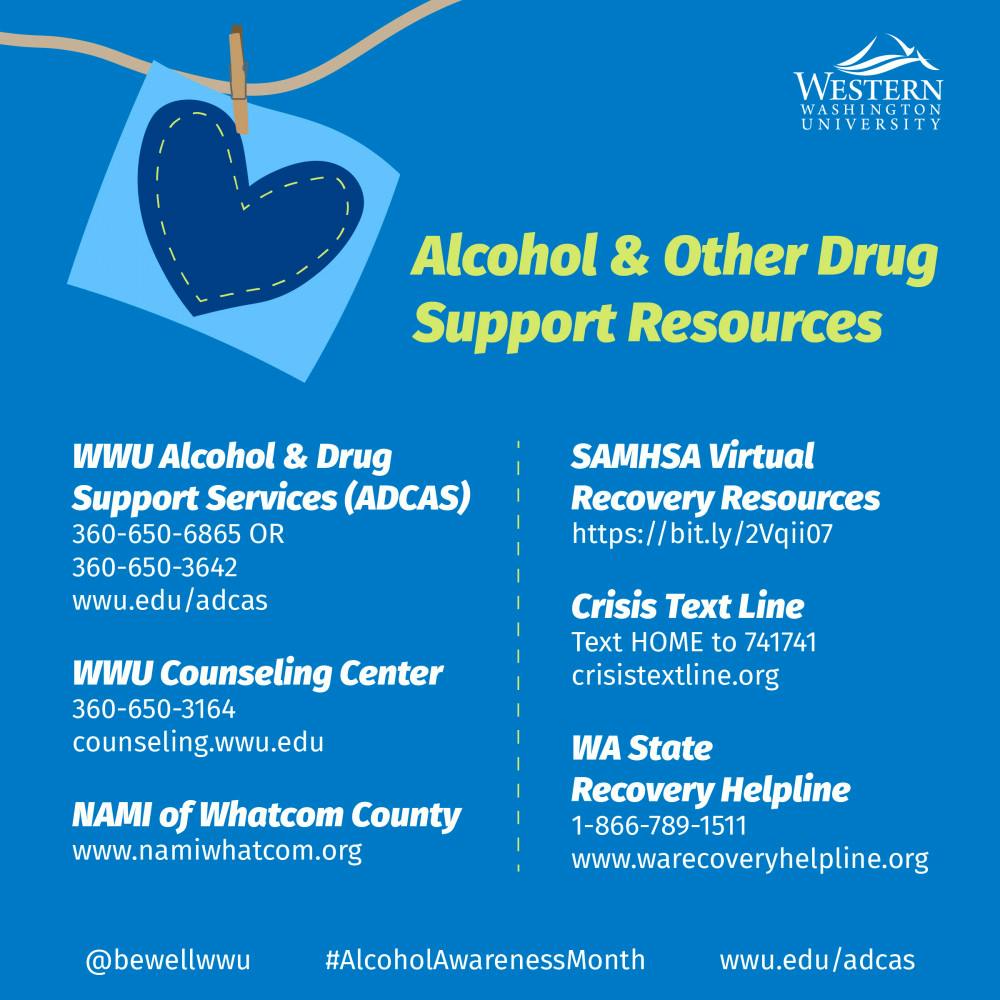
When Gov. Jay Inslee's “Stay Home, Stay Healthy” order was issued on March 23, many interactions that were originally in person transitioned to a new forum. Front line services, such as Alcoholics Anonymous, Narcotics Anonymous and Western’s Alcohol and Drug Support Services, have responded to COVID-19 changes by finding new ways to interact with people through a technological barrier.
An extra sense of stress, anxiety, depression, financial issues, isolation and boredom comes with the unknown, especially for people dealing with recovery, according to the Substance Abuse and Mental Health Service Administration website.
“We are still figuring out the best way to serve students at this time, and to make sure we are a resource that students know about and feel comfortable utilizing as much as possible,” said Jacelyn Barham, assistant risk reduction specialist at Western’s Prevention and Wellness Services.
Western Washington University Alcohol and Drug Support services took measures to continue helping students while remote classes create a barrier to on-campus services, Barham said.
“We're doing our best to let the Western population know that we are available during this time through marketing, social media and by reaching out to campus partners who may refer students to our services,” Barham said.
Barham and colleague Scott Martinez, a risk reduction specialist, have been meeting with students through Zoom, Skype and over the phone.
“The program is striving to make the experience each student gets through this technological barrier as personable and unique as possible,” Barham said.
Barham said another effective way to find help is using the Substance Abuse and Mental Health Services Administration website which provides virtual recovery resources.
Alan F. – who safeguards his full name due to Alcoholics Anonymous’s regulations – serves as the A.A. delegate for Area 72, which covers Western Washington. Alan F. said the reaction he has seen from his A.A. program the past few weeks surprised him.
“At first it’s a shock, but people are adjusting [to Zoom],” he said. “This is also a really hard time, and when things are hard, people go to more meetings.”
The accessibility to online meetings to anyone at any time was an unexpected twist, Alan F. said.
“Individuals started to compile lists of Zoom meetings, which is now thousands in the country,” Alan F. said. “People are getting up in the middle of the night for meetings in Ireland. It’s very interesting and attractive to people.”
Alan F. said during in-person meetings, the secretary of the meeting will ask people to raise hands if they’ll be sponsors, then people in need of sponsors can come up and have a face-to-face interaction. But he said people have found a way around this obstacle.
“There’s a raise-hand function people use on Zoom,” Alan F. said. “It's a little harder because you need to find their face in the little picture on the Zoom meeting. It creates an extra technological step but it’s still working.”
Alan F. said A.A. is no stranger to helping people in recovery who were physically isolated and wouldn't go to meetings previous to COVID-19.
Alan F. said that the methodology of A.A. works in two ways, for the most part face-to-face conversation. Members who are isolated use the Alcohol Anonymous book, which can be sent to them.
Zoom has now given members who are isolated the same opportunity as members who primarily use the face-to-face method, Alan F. said.
“Regular meetings will go back to normal but Zoom meetings will stay,” he said.
However, Barham said support groups are not a complete solution. She said finding support is essential through this time but it's also crucial for people to take care of themselves in as many ways as possible.
Jeff Grimm, a Western psychology professor, investigates the biology of the nervous system when in relapse. His work includes various studies performed with rats that are trained to self-administer sucrose or cocaine solution. He examines the changing variables such as the brain-stimulation and environment when the rats have cravings.
“From the fairly well-developed body of research on how stress increases addiction behaviors including relapse, using the ‘alternative reinforcement’ approach can be very helpful,” Grimm said.
Social interaction, exercise, cognitive behavioral therapy, mindfulness practices and activities that an individual enjoys are a couple of alternatives, he said.
“It’s important to appreciate the time and energy you've already put in towards achieving your sobriety goals, remember the tools you have that have worked, and keep them at hand always,” Barham said.
This can be a stressful time for students, Barham said, and while Washington state has deemed liquor stores and cannabis stores as essential she warns against using solely alcohol and cannabis to deal with stress.
“There are many ways to still drink or use cannabis moderately and recreationally, but be reflective and see if that's your main coping mechanism,” Barham said.
Students seeking mental health resources can call the ADCAS voicemail at 360-650-6865 or 360-650-3642. Students should leave a message with their name and the best phone number or student email to reach them. According to its website, an ADCAS staff person will return their call within 24 hours. If leaving a voicemail, students may add that they would like to discuss a personal substance related concern.





